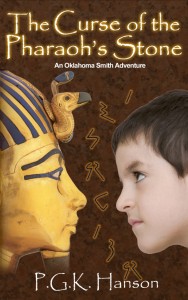 January seems to be query month for me.
January seems to be query month for me.
Last January, I queried my middle grade book The Curse of the Pharaoh’s Stone. It had some interest, but no bites. After my initial list of 50 agents passed, other issues became more pressing, and I did not continue sending it out.
Over Christmas break this past December, I compiled another list of 50 more agents for Pharaoh’s Stone, and am once more on the query-go-round.
Last time around, I wrote and compiled all 50 queries before I sent anything out. Because each agency wants you to send different material, every query is a little different. Some agencies want just a query letter, others want a certain amount of pages, others want a synopsis, and a few have online submission forms. Preparing them all is a time-consuming process.
This year, I am compiling the queries as I go along. I prepare and send about 5 a day, sometimes more, but never more than 5 at a time. I find that if I do any more than 5, I lose focus and make mistakes.
I’m not sure which approach I prefer. Compiling all the queries ahead of time allowed me to send them all out within 5 days. Doing them as I go along will take me longer to get them all out the door. I suspect the total amount of time invested is the same, it’s just a psychological difference—personal preference.
I keep a list of all the agents I contacted in Excel. Name, contact info, submission requirements, date I sent the query, and the result. Because so many agents now have a “no interest, no answer” policy, I also have a column that tracks how many days without a response. Some agents give you a time limit beyond which means they aren’t interested, so this column allows me to see at a glance if we’ve passed the deadline. As I send the queries out, I color code my agent database. Green for those out, red for the passes, and yellow for requests for full or partials. So far I have one yellow. 🙂
Do you find that you tend to query at certain times of year? What’s your query process?

November 1st: The Most Wonderful Date of the Year
And no, it has nothing to do with NaNoWri Mo. I have never done National Novel Writing Month in November, although I would like to at least once in my life. This year will not be the year, however.
No, I love November 1st because that means October is over! The last 10 days of October are a whirlwind for me: parents’ anniversary, my anniversary, my daughter’s birthday, then Halloween and all the concurrent festivals and festivities. For an introvert like myself, that’s a lot of socializing in a short amount of time. It’s also quite a bit of planning and errand running to pull off the birthday and Halloween so close together.
So when November 1st dawns, I take a deep breath and revel in the sudden silence of my social calendar. Not that November won’t be busy—I am the mom of an elementary school child, a working author, and there’s that whole Thanksgiving thing—but the month goes back to the normal level of crazy.
Although I am not doing NaNoWriMo, I plan on doing NaNoEdMo—National Novel Editing Month. I got my latest manuscript back from my editor in August, and didn’t get to look at it until October. So now I intend to buckle down and finish the revisions this month. By the end of November, I want to have a shiny manuscript ready to be sent out to agents.
Then I can spend December compiling my list of agents, readying the materials needed to send to them (query, synopsis of varying lengths), and be ready for a query storm in the New Year.
So now that I can breathe, that is my plan for the month. We shall see how well my plans pan out, since we all know how often life derails our plans!
What are you doing for November?